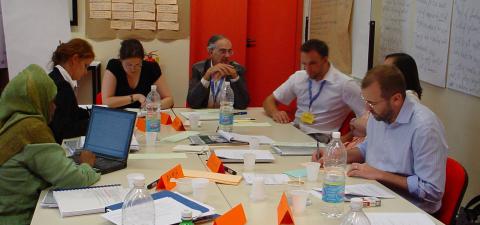
Early Warning and Preventive Measures
The proliferation of conflict around the globe has required the United Nations to establish conflict prevention efforts to support UN staff and partner organizations on early warning and conflict prevention measures. In response, UNSSC operating as a project with institutional support from the International Training Centre of the International Labour Organization (ITCILO) in 1998, launched the “Early Warning and Preventive Measures” (EWPM) programme. Significant strides were made towards increasing awareness on early warning and preventive action for UN staff and partner organizations; building institutional capacity and improving the professional and analytical skills of UN staff and promoting greater exchange and coordination within, and between departments and offices dealing with policy as well as the practical aspects of preventive action.
Funded by internal UNSSC resources, six governments and the Turner Foundation, the programme featured an average of ten, five-day workshops that were delivered in English, French and Spanish and later conducted annually in different regions. Participants from across the UN System, Regional Organizations EU delegations, civil society organizations, Member States, and private-sector organizations came together for what proved to be a timely learning intervention developed in partnership with the London School of Economics (LSE) and the then Department of Political Affairs (DPA).
Following consultations with different stakeholders, and drawing on feedback from earlier editions, UNSSC went on to deliver an even more interactive learning exchange. Participants were able to examine different country contexts with the aim of identifying the causes and stages of conflict. In addition, they surveyed different techniques to structure the early-warning analysis, and looked at the means of identifying a range of measures for a preventive action strategy. They explored ways of understanding and making use of existing coordination mechanisms and improving the effectiveness of policy recommendations.
Given the high demand for the workshops, and to build on the momentum and deliver the workshops in different languages, UNSSC launched two “training of trainers” to create a pool of EWPM trainers from the UN System, recognized think tanks, universities, and NGOs. For each workshop, a group of three to four EWPM trainers were called upon to join UNSSC as part of the training teams that were deployed to field locations to deliver training. An impact evaluation of the project found that the EWPM was highly successful in contributing to a heightened awareness of early warning and conflict prevention measures. Furthermore, the training project contributed to facilitating linkages within departments and agencies, and between field and headquarters staff. It also gave headquarters staff an opportunity to better acquaint themselves with certain aspects of conflict prevention initiatives at the field level – thus contributing to the development of a unified approach to early warning and preventive action.
Today, UNSSC continues its work in the area of capacity building for conflict prevention. From the “seeds” sown through EWPM, several new learning offerings have been developed to address emerging peace-and-security challenges. Prevention and sustaining peace continue to lie at the core of our work.